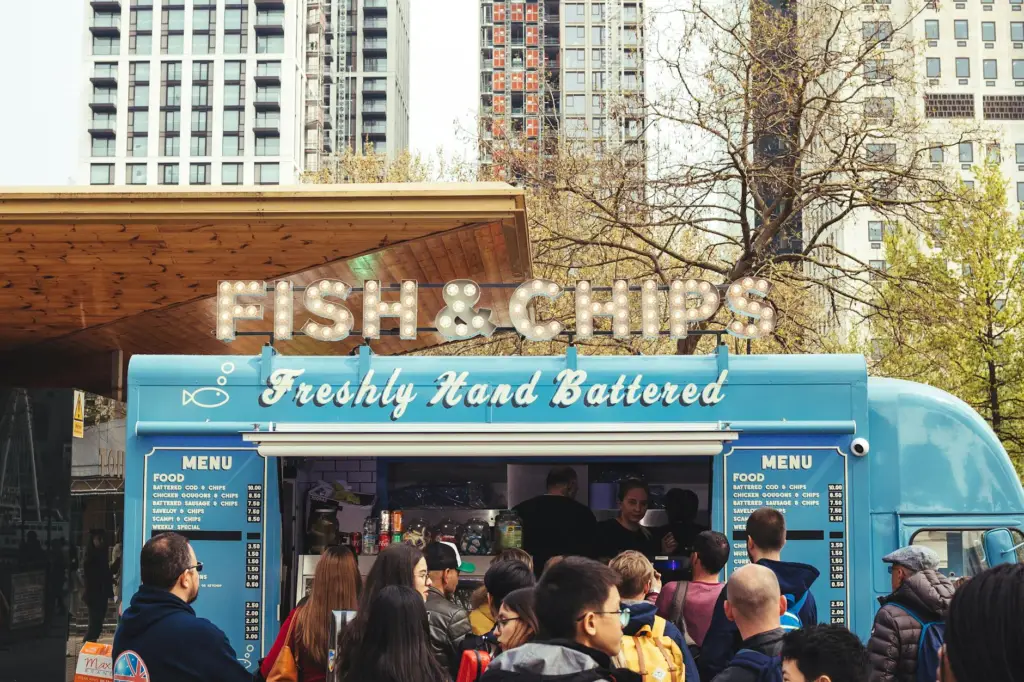Creating a 12 Startup Business Scale and Startup Cost for food Truck and Food Catering Business

Creating a business scale for startups in the food stall, food truck, or catering industry involves assessing various factors such as target market, location, menu offerings, and growth potential. Here’s a simplified scale for evaluating startup opportunities in these lines of business.

Page Contents
- 1 Creating a Startup Business Scale and Startup Cost for food Truck and Food Catering Business
- 2 12 Startup Business Scale
- 3 Here’s a breakdown of potential startup costs for a food truck and food catering business.
- 4 8 Startup Costs for a Food Truck
- 5 Total Estimated Startup Costs for a Food Truck: $44,000 – $198,000
- 6 9 Startup Costs for a Food Catering Business:
- 7 Total Estimated Startup Costs for a Food Catering Business: $16,500 – $84,000
- 8 Conclusion
Creating a Startup Business Scale and Startup Cost for food Truck and Food Catering Business
12 Startup Business Scale
- Market Research:
- Identify target demographics and consumer preferences.
- Evaluate competition and market saturation in the chosen niche.
- Concept Development:
- Define your unique selling proposition (USP) and brand identity.
- Create a compelling menu concept that resonates with your target market.
- Location Selection:
- Assess foot traffic, visibility, and accessibility of potential locations.
- Consider permits, regulations, and zoning requirements for operating food stalls or trucks.
- Menu Planning:
- Develop a diverse and appealing menu that showcases your specialty dishes.
- Consider dietary preferences, allergies, and trends when designing menu offerings.
- Supply Chain Management:
- Establish relationships with reliable suppliers for fresh ingredients and food supplies.
- Negotiate pricing and delivery schedules to ensure consistency and quality.
- Equipment and Infrastructure:
- Invest in high-quality kitchen equipment, food preparation stations, and storage facilities.
- Ensure compliance with health and safety regulations for food handling and storage.
- Marketing and Branding:
- Develop a comprehensive marketing strategy to promote your business.
- Utilize social media, local advertising, and word-of-mouth referrals to attract customers.
- Customer Experience:
- Focus on providing exceptional customer service and memorable dining experiences.
- Solicit feedback and reviews to continually improve your offerings and operations.
- Financial Planning:
- Prepare a detailed business plan outlining startup costs, operational expenses, and revenue projections.
- Secure funding through loans, investors, or personal investment to finance startup costs.
- Scalability and Growth Potential:
- Evaluate the scalability of your business model and potential for expansion.
- Explore opportunities for franchising, additional locations, or diversification of services.
- Operational Efficiency:
- Implement systems and processes to streamline operations and maximize efficiency.
- Invest in technology solutions for inventory management, scheduling, and customer ordering.
- Community Engagement:
- Build relationships with local communities, organizations, and businesses.
- Participate in community events, fundraisers, and food festivals to increase visibility and support.
By systematically assessing these factors and developing a strategic plan, startups in the food stall, food truck, or catering industry can position themselves for success and sustainable growth in the competitive culinary landscape.




Here’s a breakdown of potential startup costs for a food truck and food catering business.
8 Startup Costs for a Food Truck
- Vehicle Purchase or Lease: $20,000 – $100,000
- Cost varies depending on whether you purchase a new or used truck or opt for leasing options.
- Kitchen Equipment and Supplies: $10,000 – $50,000
- Includes cooking appliances, refrigeration units, food preparation stations, utensils, and serving containers.
- Permits and Licenses: $1,000 – $5,000
- Fees for health permits, business licenses, food handler certifications, and parking permits.
- Vehicle Customization and Branding: $5,000 – $20,000
- Design and installation of vehicle wraps, signage, and branding materials to attract customers and build brand recognition.
- Initial Inventory: $2,000 – $10,000
- Purchasing ingredients, food supplies, and packaging materials to stock your truck for initial operations.
- Insurance: $2,000 – $8,000 per year
- Liability insurance, vehicle insurance, and workers’ compensation insurance to protect your business and assets.
- Marketing and Promotion: $1,000 – $5,000
- Costs associated with promoting your food truck through social media, advertising, and promotional materials.
- Miscellaneous Expenses: $3,000 – $10,000
- Includes expenses such as website development, point-of-sale systems, accounting software, and initial working capital.
Total Estimated Startup Costs for a Food Truck: $44,000 – $198,000
9 Startup Costs for a Food Catering Business:
- Kitchen Rental or Lease: $500 – $3,000 per month
- Cost varies based on the size and location of the kitchen space rented for food preparation.
- Kitchen Equipment and Supplies: $5,000 – $30,000
- Includes commercial-grade cooking appliances, refrigeration units, utensils, and serving equipment.
- Permits and Licenses: $500 – $3,000
- Fees for health permits, business licenses, food handler certifications, and catering permits.
- Transportation: $5,000 – $20,000
- Purchase or lease of vehicles for transporting food, catering equipment, and staff to event locations.
- Initial Inventory: $1,000 – $5,000
- Purchasing ingredients, food supplies, and packaging materials to prepare for catering orders.
- Insurance: $1,000 – $5,000 per year
- Liability insurance, business insurance, and workers’ compensation insurance to protect your business and employees.
- Marketing and Promotion: $500 – $3,000
- Costs associated with marketing your catering services through online channels, print materials, and networking events.
- Staffing: $2,000 – $10,000
- Hiring and training staff members for food preparation, event setup, serving, and cleanup.
- Miscellaneous Expenses: $1,000 – $5,000
- Includes expenses such as website development, catering software, office supplies, and initial working capital.
Total Estimated Startup Costs for a Food Catering Business: $16,500 – $84,000
Conclusion
These figures are estimates and can vary based on factors such as location, size of the operation, equipment quality, and business strategy. It’s essential for aspiring entrepreneurs to conduct thorough research and create a detailed business plan to accurately assess their startup costs and financial projections. Additionally, exploring financing options such as small business loans, grants, or investors can help cover initial expenses and support the launch of a successful food truck or catering business.







